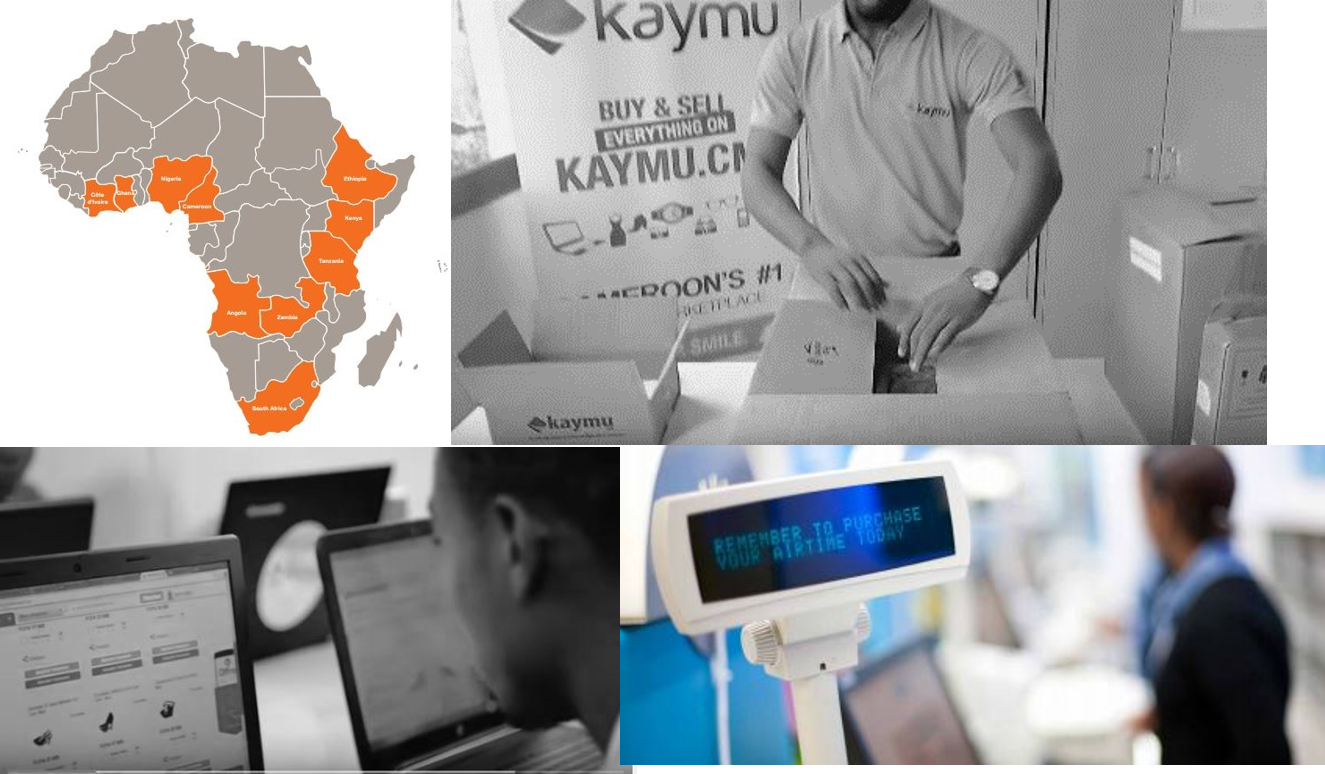Cet article est également disponible en français.
E-commerce in Africa is the ideal channel to overcome the challenges that prevent the development of retail sector.
In a recent comprehensive report in which I had the chance to contribute, the South African subsidiary of PricewaterhouseCoopers (PwC) presented the current situation, challenges and opportunities in retail business and online & offline mass distribution in Sub-Saharan Africa which is considered as a geographical region experiencing one of the fastest expansions in this sector. This report focuses primarily on ten countries which offer maximum opportunities: Angola, Cameroon, Ethiopia, Ghana, Ivory Coast, Kenya, Nigeria, South Africa, Tanzania and Zambia.
The study is organized into separate sections and presents the prospects, demographic and economic situation of each country as well as testimonials from local experts in this industry.
 1. The potential of Cameroonian market
1. The potential of Cameroonian market
In the case of Cameroon (pages 24-31), several topics are discussed such as: the quality of human capital which is relatively more educated and trade oriented than the average in the region, the under-utilized opportunities in textile and agricultural industry (see the Article by Celine Fotso on this topic), the relatively small market size if compared to huge neighbor Nigeria, the Port congestion at Douala and many more. To sum up, according to this report, Cameroon has, despite regulatory, logistical and security challenges, a vast exploitable potential in retail sector:
- Growing number of women, traditionally responsible for kitchen, are now entering labor market and therefore are busiest. This creates a real demand for food products that are pre- packaged or easy to cook.
- There is a huge growth potential in the diversified product lines offered in the local market and in improving the formal distribution in rural areas
- Growing number of women, traditionally responsible for kitchen, are now entering labor market and therefore are busiest. This creates a real demand for food products that are pre- packaged or easy to cook.

One thus finds very interesting information about local players such as Chococam, Biopharma, SABC (Breweries of Cameroon), Diageo (Guinness), UCB, Nestle (Maggi, Nescafe, etc), Unilever, Olam, the Mercury Group and its chains (Casino , Kadji square, City Sport, Guess, Aldo, etc), Santa Lucia, Tsekenis, the Arno Group and CFAO among others.
2. eCommerce: to the rescue of African Consumer and traders
As you may guess, I was naturally more interested in that part of this report which is related to the emergence of online business. According to this report, although it is still in its infancy in most sub-Saharan African countries, e-commerce is gradually transforming the role of traditional brick-and-mortar store. Thanks to the low development of retail business, e-commerce holds numerous opportunities for African consumers. It offers competitive prices and allows consumers in urban areas with heavy traffic to avoid long traffic jams for going to market or shopping centers. E-commerce also presents a strong added value to the citizens living outside big cities, where the choice in terms of consumer products is more limited.
“People are very fashionable and trendy. They like to be different. If you can offer something unique and at an affordable price – jackpot.”
Levels of development vary greatly from country to country. In this way, countries such as Cameroon and Ghana are in this domain less advanced than countries like Nigeria, Kenya and South Africa which have multiple players in e-commerce sector, some of these initially being conventional retail chains. But globally, the industry is really driven by “pure players” of e- commerce, including the impressive Africa Internet Group. This group is present in 23 countries and consists of brands such as Zando (mode) Kaymu (marketplace) and Jumia (online mall). Many retailers have also ventured into e- commerce through third party platforms such as Kaymu (www.kaymu.com) which allows them to sell their products online more easily.

Selling online in sub-Saharan Africa generally comes with certain challenges that I have comprehensively described in an interview on the website www.howwemadeitinafrica.com
These challenges include low banking penetration which limits the ability to pay by credit card and forces most e -commerce players in sub- Saharan Africa to offer payment on delivery, as indicated by this infographic. Several countries have found mobile payment as an effective alternative to payment on delivery option, at least for transactions at national scale. The benchmark in this domain is undeniably Kenya, a pioneer in Africa for mobile payment with about 14 million users by the time of completion of this study.
The report also highlights the impact of Kaymu on the Cameroonian market, on the Cameroonian consumer-tastes and the investment in education and support from merchants, professionals or part-time in the development of their online businesses. One of the things I mentioned in this report (on page 28) is the appetite of Cameroonian consumers for products that are “trendy” or fashionable.
Click here to download a free copy of the report “Prospects in the retail and consumer goods sector in ten sub-Saharan countries ” from PwC
Found this article and/or this report interesting? Feel free to share via Facebook, Linkedin or Twitter with your community, friends or colleagues working in retail, the consumer good sector, or e-commerce!


[…] This article is also available in english. […]